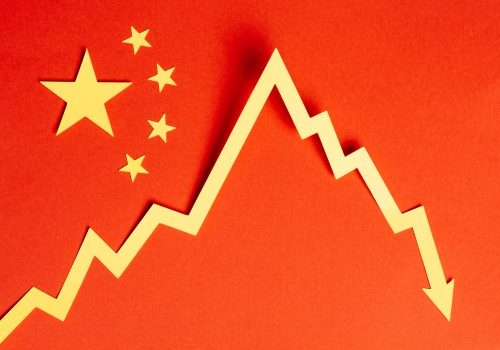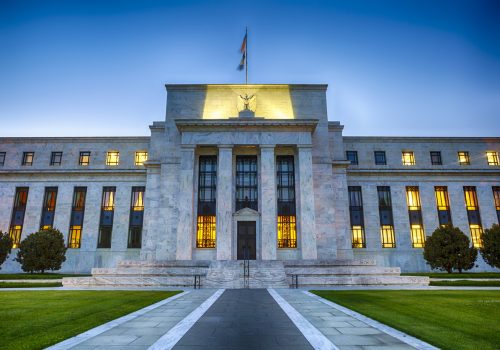FAST THINKING: The Fed pulls the emergency brake. Will it work?
JUST IN
Can they stop the runaway train? The US Federal Reserve hiked its benchmark interest rate by three-quarters of a percentage point Wednesday in an effort to curb rocketing inflation. The single biggest rate increase since 1994 will probably cool down the economy—but it will be a difficult balance to tame inflation without sending the world’s largest economy into a downward spiral. Our global economic experts take you behind the numbers to understand what’s next in this uncertain monetary moment for the United States and the wider world.
TODAY’S EXPERT REACTION COURTESY OF
- Josh Lipsky (@joshualipsky): Senior director of the Atlantic Council’s GeoEconomics Center
- Ole Moehr (@ACGeoEcon): Fellow with the GeoEconomics Center
LOW PRICES, GUARANTEED?
- Josh tells us the precise amount of the rate hike actually doesn’t matter as much as the bank “sending a signal to markets that the Fed has this under control. It’s about restoring confidence.”
- So will it help whip inflation, which now sits at a forty-year high? That’s where it gets more complicated, Josh adds: “Here’s a great economics answer: Yes and no.” While hiking rates won’t help with soaring gas prices in the short term, it will ease demand for everything from homes to everyday goods. “If money is more expensive to borrow, people will borrow less and spend less, and prices will come down.”
- But Ole notes that a series of rate hikes alone won’t do the trick in a highly interconnected global economy. “If the Fed’s actions are accompanied by an easing of global supply bottlenecks, we should see inflation come down significantly in 2023.”
READY FOR A RECESSION?
- While the Fed doesn’t have a great record in cooling the economy without freezing it, Josh tells us, history offers some hope—since then Fed Chairman Alan Greenspan’s 1994 rate hike “was one of the rare circumstances where the Fed did engineer a soft landing.”
- But recent history is less encouraging, Josh adds: When sources inside the bank signaled ahead of today’s meeting about a higher-than-expected hike, their urgency to warn financial markets was an ominous sign. “Translation? The Fed is worried.”
- The Fed hoped to avoid a move like this, Ole says, but signs of broader inflation across the economy (such as rents continuing to rise and consumers spending more on services) required a more hawkish turn even though it “shrinks the landing strip to avoid a recession.” He adds that “today’s decision makes it more likely that the US economy is headed toward a downturn within the next two years.”
- And if the rate hikes don’t tame consumer demand, things could get worse, Ole tells us: “The US economy could face a worst-case stagflation scenario of high unemployment, high inflation, and low growth.”
KNOCK-ON EFFECTS
- Central banks around the world are adjusting to this new moment, as GeoEconomics Center research shows. All eyes are now on the European Central Bank, Ole says, which called an emergency meeting today and is expected to soon follow the Fed’s example. “The ECB must now attempt a balancing act of tightening monetary policy to lower inflation while continuing to provide support for economically vulnerable euro area countries.”
- Broadly, though, “the Fed raising rates is a problem for the whole world,” Josh believes. That’s because a strong dollar and high rates will compel investors to pull their cash from other countries and park it in the United States. “That can really hurt an emerging market economy and, in fact, cause an economic crisis for these countries.”
- That will lead to other central banks raising their rates to compete, Josh adds—with the end result being “tighter money all around the world and, unfortunately, a decent chance of a global recession.”
Further reading
Thu, Jun 2, 2022
Central banks are embracing digital currencies. Will the US lead or follow?
New Atlanticist By Ananya Kumar, Josh Lipsky
Six takeaways from our new research on fiat-based digital assets around the world and what they'll mean for your wallet.
Wed, May 25, 2022
A new type of global recession
Econographics By Josh Lipsky
For the first time, it's China's pronounced slowdown which could be the single largest factor in creating a global recession.
Mon, May 9, 2022
Deploying QT – The Fed readies its new tool to fight inflation
EconoGraphics By Ole Moehr
June 1 onwards, the Fed will begin to reduce the size of its balance sheet, i.e., conduct quantitative tightening. But how does QT work, what are its goals, and are there potential risks of the policy?
Image: US Federal Reserve Board Chairman Jerome Powell takes questions from reporters during a news conference in Washington on June 15, 2022. Photo by Elizabeth Frantz/REUTERS


